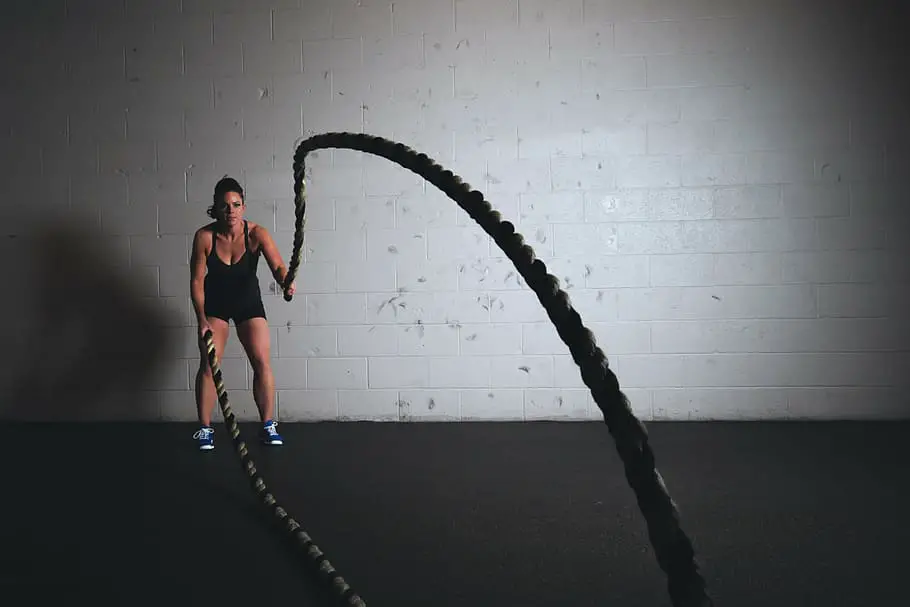Exercising has luckily become a common trend nowadays.
With social media on the avant-garde of fitness literature, sharing training-tips, results, and concerns is so easy that everyone wants to start exercising and losing weight.
Even so, a common topic in these fitness accounts, channels, and forums is if it’s normal to gain weight when you start working out.
To prevent you from freaking out, we are going to say it straight forward:
YES! You will gain some pounds when you first start training.
But, you must not worry about this, as this is part of the process.
And, you may rest assured that, if you are consistent with your lifestyle, that weight won’t stick for long!
But, why does this happen? If you’re burning more calories than you take, exercising, and eating healthy, your scale should go down immediately, right?
WRONG! There are a series of factors that come into the game and are a regular part of the process, let’s take a look at them!
Why you’re gaining weight even when You Start working out?
There are many factors that contribute to weight gain after you start training.
Let’s take a look at the main ones and how do you prevent that from happening.
The main factor: water

Water has a more significant impact on your scale than you can imagine.
Our body can retain enough water to move the scale a few pounds up or down in a matter of hours, and this becomes even clearer when you start training.
So, assuming you’re eating healthy, the first factor that affects your weight when exercising is, then, water.
But, how does water make you gain weight even after you start working out?
1. Water Retention From Fluid Loss
When we’ve just trained for a couple of hours and we’ve sweated a lot, losing water is the natural result.
This will reflect in the balance, which is the reason why we are also lighter in the morning before our organs get hydrated.
But, liquid-loss has its counterpart, water retention.
Water retention happens as a preservation mechanism from the body, which is adapting to the changes.
As you’re losing fluids quickly, your body enters in alarm-mode, and your plasma retains more water to prevent dehydration.
This alarm results in water excess in your body, and the consequent reflection on the scale.
The same happens when you don’t drink enough water, which may seem ironic, but it isn’t; it’s just the way our body regulates itself!
Unfortunately, that’s not the only way in which water retention will get you frustrated in your weight loss journey.
2. Water Retention After Losing Fat
It’s no secret that fat takes a considerable space in our body, and when we burn it, that space must be filled until the body adapts to the change.
The same thing that happens with the liquid you lose during training can happen with the fat when you haven’t gained enough muscle.
Water comes in to fill the space that fat has left behind, and therefore, turns the balance up again.
Have you ever noticed that your scale went a bit down for a few days, and it suddenly goes up overnight?
We know that’s frustrating to see but, unless you’ve overeaten by thousands (and we mean thousands) of calories the day before, that weight is just water retention. YES! You’re not overweight!
3. Water Retention From Sodium Excess
Another common cause of weight gain when you start working out is sodium excess.
Losing tons of water and burning more calories than before, impact your organism.
This is especially true if you’re on a weight loss diet.
Overeating or craving salty foods is a frequent response to these changes.
And, even without noticing, your sodium intake may have increased the first weeks you work out.
Sodium, specifically salt, makes your body retain water and might be the cause of those extra pounds.
Other factors such as menstrual hormonal changes also determine your levels of water retention and make your weight fluctuate, even when working out regularly (here you can find a full study on this).
But, you don’t need to worry!
After a few days, your body alarms will go off, and the hyperhydration will decrease, reflecting your real weight on the scale!
How To Avoid Water Retention When You Start Training?
While water retention will be part of your new healthy lifestyle, at least during the first months, there are some measures you can take to prevent that extra weight.
To avoid water retention and weight gain when you start working out, you may want to try:
Drinking More Water
If you keep yourself hydrated enough, your body won’t feel the urge to accumulate water, and the hyperhydration will disappear.
Reduce Salt In Your Diet
A small amount of sodium is ok. But if you continuously eat salty foods, the sodium particles will bind to water, and you’ll accumulate it on your body.
Get Enough Sleep
Not resting enough and putting yourself under stress may cause water retention as well as other causes of extra weight.
Avoid Refined Carbs
These carbs, as well as refined sugars, rush up your blood sugar levels, making you absorb more sodium, and therefore, retain water.
Diuretics
If you have a natural disposition to retain water, your doctor may prescribe you diuretics that will help you control your water level.
Move Around
This is probably not your case if you’re working out, but sitting all day long causes water to accumulate.
Now, that you know how to avoid water retention, you have one less problem to worry about.
But, while water is the main reason why it’s normal to gain weight when you start working out, there are still other factors that can play an essential part in your scale tracking.
Other Factors That Contribute To Weight Gain When You Start Training
If you start an exercise program your body will add some extra weight as a natural response to the changes taking place.
Don’t worry, it won’t last if you keep exercising. Here are the 4 factors why your scale goes up when you start training.
Inflammation or Microtrauma

If you’re into fitness, you’ve probably heard these terms before.
But, for those who may not, it’s essential to know that when you work out, muscle fiber breaks or gets what we know as microtrauma.
This microtrauma causes training-related pain known as delayed-onset muscle soreness or DOMS.
It causes inflammation in consequence, as a part of the healing process of your body and muscles (increased blood flow, white cells concentration, tissue formation).
And, even though this inflammation doesn’t mean more fat, it can increase your scale numbers for a few days.
Luckily, if you allow your body to rest, your scale will go back down, and your new powerful muscles will rise.
This leads us to the next reason why it’s normal to gain weight when you start working out.
Lean Muscle Gain

Everyone who’s training, particularly if they’re into weight lifting, wants muscle gain.
But, it’s common to forget that weight loss and muscle gain may have a directly proportional relation.
This means that more muscle represents more weight. Isn’t it? Well, allow us to explain more…
You’ve probably heard that common gym phrase: “Muscle weighs more than fat”.
While it’s not accurate, it does reflect some true: You will see your scale up when you gain muscles, even if you look thinner.
Why is that? Because, while one pound of muscle and one pound of body-fat are both still one pound, the volume or the space they occupy is, in fact, different.
That one pound of muscle needs much less space in your body than the pound of fat.
In this sense, the amount of fat and muscle in your body will be reflected by your Body Mass Index (BMI), not the scale.
Because the scale will still measure the pound even if it occupies a smaller portion of your body, right? You’ve got the point.
Of course, this difference won’t be overnight.
But, if you are eating healthy and you see your clothes start being loose even when your scale won’t go down… Congratulations! You’ve burned some fat and replaced it with a lean muscle gain!
Intestine By-Products

So, yes, what you eat impacts the numbers on your scale.
But this time, we mean it a more direct way, not just talking about a caloric deficit.
Some food takes longer to digest and may stay in your intestinal tract for longer, and of course, it weighs.
As we already mentioned above, all the changes your body traverse when you start training, make you want to eat more.
As you’re working out and probably seeking a weight loss, you’re presumably also on some kind of nutritional regime.
Many of these lead you to increase your fiber intake and, while fiber will improve your digestive functions, it makes intestine by-products heavier.
Also, when you’re just starting your healthy lifestyle, they may take a bit more to get out of your system, occasioning a temporary weight gain.
Too Much Stress and Not Enough Rest

While you may be willing to work out every day to achieve your fitness goals, resting is an essential part of both gaining muscle and losing weight.
When you don’t get enough sleep hours, or you’re under heavy stress, your fiber recovery process doesn’t get to term, and inflammation doesn’t give up.
On the contrary, stress can trigger other inflammatory processes, as too much Cortisol – the stress hormone – in your body can slow down your metabolism.
Exercising puts your body in a stressful situation, especially in the first months.
If you add external stress factors, such as work and family, you get the perfect recipe for inflammation.
A combination of muscle inflammation and intestine inflammation is one of the main reasons why it’s normal to gain weight when you start working out.
When Should You Weigh Yourself?
As you may have seen in this article, paying too much attention to your scale may not always be the best answer.
Better to ignore it from time to time, and in case you may want to use it, be sure to know when to weigh yourself to get an accurate result:
Weigh Yourself Once A Week
It’s only when you’ll be able to see any real change. Otherwise, any change may respond to the reasons we've already saw.
Only In The Morning
While it’s true that morning weight is not out real weight, it represents the less variable factor to compare results in the long-term.
Weigh Yourself Naked (If Possible)
Weighing yourself with clothes or shoes on – especially if they’re sweaty – may add some extra weight.
Avoid The Scale
When women are on their periods they tend to retain water. Just ditch the scale during those days! The same applies for sexes when they’re sick; it’s no use on those numbers so, why weighing yourself at all?
Conclusion – Weight Gain After Working Out?
So, now you know that the scale may be tricky some times, and it’s not always the best way to track your weight loss progress.
Of course, it may be useful, especially if you’ve been working out and eating healthy for some time.
But, if you’re new to fitness and you’re worried about what it says, don’t be!
It’s normal to gain weight when you start working out, and it’s not a reason to quit.
On the contrary, if you see these fluctuations, it’s because your body is responding to what you’re doing!
Keep on the hard work! If you see some improvement, share it with us in the comments section and help others enjoy their fitness ride to health!
P.S: If you want to supercharge your power and quicken your results with quality supplements but don’t know which product to use – Take this short quiz to find out what supplement is best for your individual goals.


